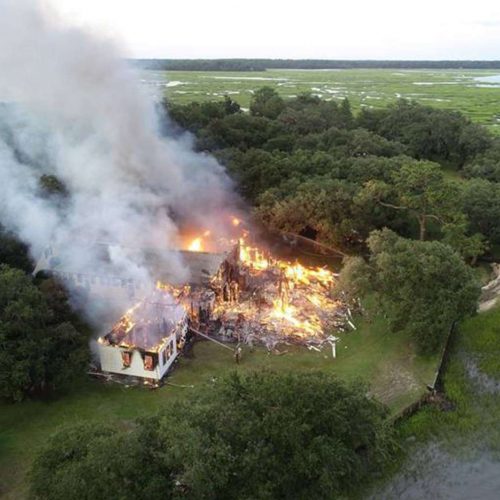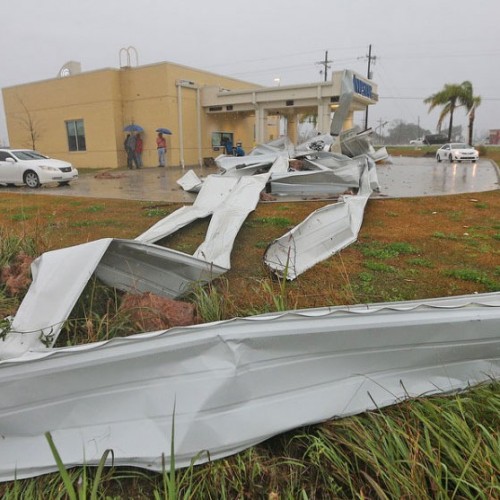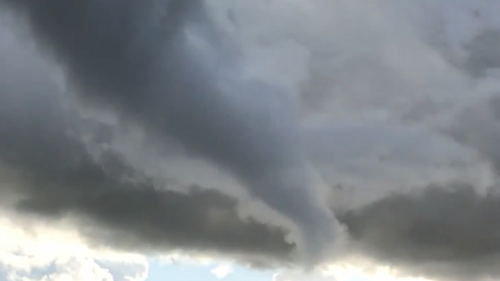CONCORD — A rare nighttime tornado, packing winds of up to 100 miles an hour, cut a destructive half-mile path Monday morning, uprooting trees and damaging dozens of homes.
The twister, which touched down around 3:20 a.m., caused significant tree damage and left hundreds of homes without power. But there were no injuries, and somehow just one house sustained significant structural damage, officials said.
“No injuries. No deaths. Lots of cleanup,” said Concord Fire Chief Mark Cotreau, who urged people to stay away from the area because of dangerous downed power lines. Damage was concentrated in the area near Alcott and Independence roads, where trees were uprooted or sheared off at the top by a storm one resident described as “ungodly.”
After assessing the damage Monday to determine whether it was indeed inflicted by a tornado, National Weather Service meteorologist Alan Dunham declared: “I’ve seen enough evidence. This was caused by an EF1 tornado.”
That designation applies to tornados that are relatively weak, but still strong enough to cause significant damage and rip the roof off homes. The ratings go from EF0 to EF5.
In all, 39 homes were damaged, officials said. The area around Independence and Alcott roads, which received the brunt of the storm, was littered with fallen trees, leafy branches, and power lines.
Kurt Schwartz, who directs the state’s emergency management agency, said the storm recovery, from clearing trees to rebuilding damaged infrastructure, could cost about $1 million. The agency will help the town determine whether it qualifies for disaster relief, he said.
Forecasters said it was the first night tornado in Massachusetts since July 11, 1970, when a twister hit Townsend at 2:15 a.m. Because tornados are generated by warm, moist air, they are less likely to occur at night.
Residents said they were jolted from sleep Monday morning by a sound so loud and unusual it defied easy description.
“It was the weirdest thing I’ve ever heard,” said Jim Coyne, adding that a “strange, aquamarine” light filled the sky as the storm roared through. In his backyard, the top of a 100-foot oak tree was stuck in the ground like a stake, sliced away by the powerful winds.
Sal Giurleo, whose flower shop was hit by a large oak tree, said the storm carried a frightening force.
“It was ungodly,” he said. “My whole house shook, and it sounded like — I don’t even know what.”
At a news conference in Concord, Governor Charlie Baker said the town was fortunate no one was hurt given the ferocity of the storm.
“Anyone who doubts the fury and precision of Mother Nature just needs to take a walk down that road,” he said.
The storm also struck Marlborough, but damage there was limited to downed tree limbs and power lines, officials said.
In Concord, the tornado tore down power lines and snapped large trees like toothpicks.
“All of my trees are gone, but the house still stands,” Jeff Wheeler, 60, said Monday morning, hours after the winds had ripped through his neighborhood.
Dunham, of the National Weather Service, said the uneven damage pattern was indicative of a tornado. Some clusters of trees fell one way, while others, just a few yards away, were twisted in the opposite direction.
“You have one area where trees are down all over the place, and then the next house over has nothing,” he said. “It’s a very finite area that is involved with the damage.”
While the winds were strong enough to cause significant damage on their own, Dunham said the state’s prolonged drought likely contributed to the damage.
“What made it harder this time is that the ground was so dry,” he said. “Usually if the ground is moist, it helps hold the trees in. In this instance, you’re seeing a big ball of dirt.”
Matthew Doody, a meteorologist for the National Weather Service, said the tornado was caused when a weakening cold front clashed with a strong wind shear.
“It’s not a fluke, we do get tornadoes,” he said. “It just needs everything to come together at the right time.”
A tornado struck Westminster in June 2015, the weather service said. In 2014, an EF2 tornado hit Revere, the first twister in Suffolk County in at least 60 years.
Chris Park, 51, said he was awoken in the early hours of Monday by the emergency alert system on his phone, which was activated by the state’s emergency management agency. He took refuge in his basement with his son as pine cones and branches slammed into his windows.
“It was unbelievable,” he said, as he surveyed the damage on his street.
By noon, much of the debris had been removed. Tucker Delehey, 18, sat on his bike as crews cleared the road.
“It’s pretty shocking to see anything like this,” he said. At his house, just down the street from the hardest-hit area, there wasn’t even a branch on the ground.
By Trisha Thadani AUGUST 22, 2016
Photo by DINA RUDICK/GLOBE STAFF “Crews in Concord spent most of Monday morning cleaning up downed trees and fallen power lines”





